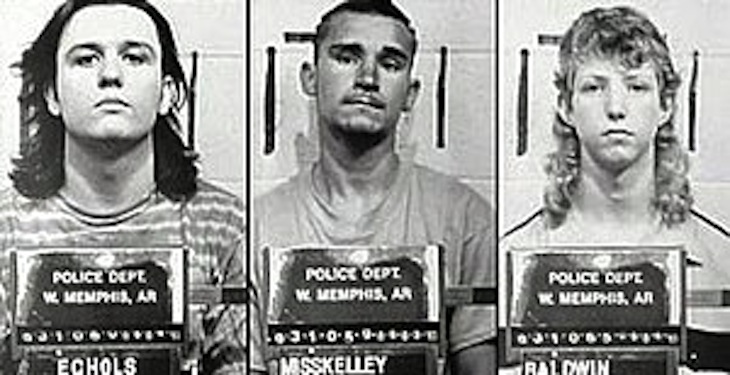Echols hearing before the Arkansas Supreme Court likely in early 2024
by November 21, 2023 2:33 pm 10,659 views

Damien Echols, Jason Baldwin and Jessie Misskelley Jr., were convicted of the murders of three 8-year-old boys in West Memphis in 1993.
Damien Echols plight to force the state of Arkansas to test ligatures used to bound three boys murdered in West Memphis on May 5, 1993, likely won’t be decided by the Arkansas Supreme Court until next year.
The Court is still waiting on an amicus brief from the Innocence Project that is expected to be filed before the end of the month. Once that brief has been filed the appeal will be “get in line” behind previously filed cases to be officially submitted to the high court, Arkansas Supreme Court Clerk Kyle Burton told Talk Business & Politics. It’s difficult to predict when it will be heard, Burton said.
Since it’s a criminal case, it could take precedent over some of the civil cases that have already been filed. Once submitted, justices will render a decision in two to four weeks. That means the timeframe for a decision could span from January to April of next year.
Echols, along with two co-defendants, pleaded to Alford pleas on Aug. 19, 2011, for the murders of Stevie Branch, Christopher Byers, and Michael Moore. The three men, often referred to as The West Memphis 3, have maintained their innocence in a case that has drawn worldwide attention for decades.
Echols asked prosecutors in 2020 if the shoelaces that bound the 8-year-old boys could be M-Vac DNA tested. Often referred to as “touch” DNA testing, the company’s CEO Jared Bradley previously told Talk Business & Politics that the killer or killers were the last person or persons to touch those ligatures.
Shoelaces are coarse and can potentially remove enough skin cells for the testing to be successful, he said. If they can be M-Vac DNA tested, Bradley said he thinks it will reveal who killed the boys.
Initially the prosecutor at the time, Scott Ellington, agreed to the testing. After he was elected judge however, the newly appointed Prosecutor Keith Crestman fought to not allow the testing to move forward. Crestman told Talk Business & Politics in April of 2021 he would seek an order from the judge to destroy all the evidence in the case. When Echols filed a motion in Crittenden Circuit Court to ask for the testing, Crestman opposed it stating in court documents that the testing could destroy the evidence.
Bradley balked at Crestman’s filing, noting that the FBI has credited the advanced testing technique for solving many cases throughout the country in recent years. Repeated attempts by Talk Business & Politics to contact Crestman and ask him about this discrepancy were ignored. His appointed term as prosecutor ended last year.
Judge Tonya Alexander denied Echols’ petition in June 2022. Alexander told Echols during that hearing that since he was no longer imprisoned he could not seek relief in the form of DNA testing. Echols’ defense team member Lonnie Soury said the ruling was an incorrect interpretation of the law. There are consequences that a wrongful conviction brings to a defendant that go beyond incarceration, and many have sought relief even after being released from prison, he added.
CASE HISTORY
Branch, Byers, and Moore were riding their bikes in their neighborhood on May 5, 1993, when they vanished. Their nude, bound bodies were found a day later in a drainage ditch that bifurcated a wooded area near the neighborhood known as Robin Hood Hills.
A month into the investigation, the three defendants were arrested and charged. Prosecutors claimed the murders were part of a Satanic or occult ceremony. Misskelley gave a series of error-riddled confessions that led to the arrests, although he later recanted and claimed he was coerced.
Misskelley, who suffers from documented learning disabilities, got the time of day wrong, the place where the attacks took place wrong, said the boys were bound with ropes, and in all his confessions he told police the boys were sexually assaulted.
State medical examiners and forensic pathologists working at the behest of the defendants agreed in court that there was no evidence of a sexual assault, and if the assault described by Misskelley happened there would be clear physical evidence to prove it of which there is none.
Echols was sentenced to death and the other two received life sentences in 1994 even though no forensic evidence tied them to the crime. Hairs from the crime scene were DNA tested in 2005 and in 2007. None of the hairs tested were a match for Echols, Baldwin or Misskelley. One hair found in the ligature that bound Moore was a likely genetic match for Branch’s stepfather, Terry Hobbs, and another hair found was a partial match to his alibi witness, David Jacoby. Hobbs has denied involvement as has Jacoby.
Jacoby has also signed a sworn affidavit stating he was not with Hobbs when the boys vanished. Hobbs told Talk Business & Politics last year he didn’t support DNA testing the ligatures and he hoped a judge would order all the evidence destroyed in the case. His reasoning was that he was tired of dealing with the “WM3 and their supporters.”
